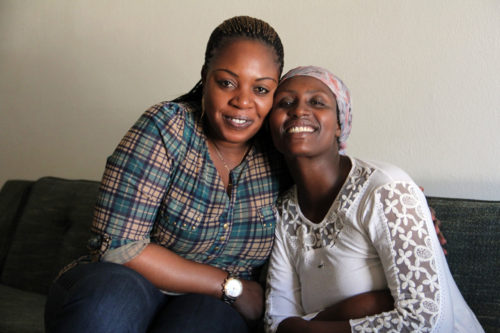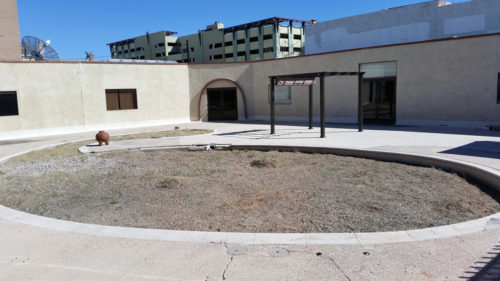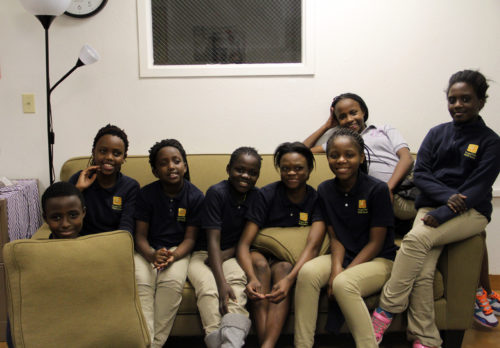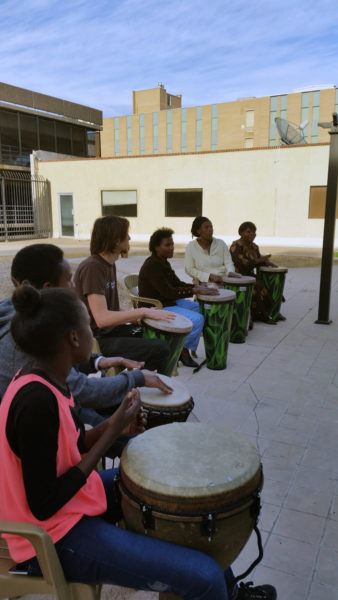Refugee women, children rebuild lives in ArizonaPosted Mar 2, 2015 |
|

Congolese refugees Jeanine Balezi, an intensive-case manager for Refugee Focus, left, and Namughisha Nashimwe, pose for a photo in Nashimwe’s apartment in Tucson. Photo: Lynette Wilson/ENS
[Episcopal News Service – Tucson, Arizona] Peace and security that let them close their eyes and sleep at night; the ability to work and provide for their families: These are the things that female refugees – most of them single mothers – say changed most dramatically in their lives after they were resettled in Tucson.
“I’m really doing much better here. There’s food on the table. The kids are in school. I have clean water, milk and, most of all, peace,” said Murorunkwere Zaburiya, 58. “I can sleep in quiet.”
A Congolese refugee, Zaburiya arrived in Tucson seven months ago with five children, aged 10 to 26, after spending 18 years in a refugee camp in Rwanda.
Illiterate and not speaking a word of English, she became a member of a women’s empowerment group operated by Refugee Focus, which receives support from Episcopal Migration Ministries through funding from the United States government’s Office of Refugee Resettlement.
Today, Zaburiya has learned the skills necessary to hold a job. Through English as a Second Language courses, she is beginning to recognize English words. And her children are receiving an education.

Women learn basic math skills during a morning training workshop at Refugee Focus’s office in downtown Tucson. Photo: Lynette Wilson/ENS
Through Episcopal Migration Ministries, the Episcopal Church partners with 30 resettlement affiliates in 26 dioceses nationwide. It is one of nine agencies working in partnership with the U.S. Department of State to welcome and resettle refugees to the United States.
“Episcopal Migration Ministries is part of this really wonderful, humanitarian program that allows some of the most vulnerable people in the world to start rebuilding their lives,” said Nicolle Trudeau, Refugee Focus’s director, during an interview with Episcopal News Service in her downtown Tucson office. About half of the 300 refugees served annually by Refugee Focus come through Episcopal Migration Ministries.
In 2014, the Episcopal Church and its partners worked to resettle 5,155 of the tens of thousands of refugees who came to the United States through the United Nations High Commissioner for Refugees’ (UNHCR) screening process. They’ll work to serve as many people this year as the United States plans to resettle 70,000 refugees — half of the 1 percent of the 15.5 million refugees worldwide who’ll be resettled this year.
Many of those refugees will come from the Democratic Republic of Congo.
Since 1998, more than 5.5 million people have died in the Congo from fighting, disease and malnutrition; 2.5 million people have been internally displaced; and some 500,000 have fled the country’s protracted conflict, with the vast majority living in refugee camps in the Great Lakes and Horn of Africa regions.
Over the next several years, UNHCR plans to resettle 50,000 refugees from the Congo, with 70 to 90 percent to be resettled to the United States, said Kurt Bonz, Episcopal Migration Ministries’ program manager, during a recent webinar hosted by the Episcopal Church aimed at educating the faith community about the situation in the Congo and how to support and advocate for Congolese refugees.
“Most of the refugees have been in camps an average of 20 years, education is low, and many are single women with children who continue to experience trauma related to living in the Congo, the journey out and living in a refugee camp,” he said.
Ongoing armed conflict has been particularly brutal in the Congo; the number of Congolese women-at-risk is double that found in other refugee populations. This has led to studies aimed at identifying particular risks, challenges and strengths and developing strategies for policymakers and service providers to better serve the women and their families.
A refugee is someone who has fled their country of nationality and its protection because of a “well-founded fear of persecution” based on race, religion, ethnicity, political or social affiliation. Among female refugees considered “women-at-risk,” most have endured rape and other forms of gender-related sexual violence, with many giving birth to children conceived as a result of rape.
Upon arriving in the United States, refugees receive three months of case management and financial support to help them adjust, plus additional support to help them find employment and reach financial self-sufficiency. The formula works for some but not all refugees. Programs funded by the U.S. Department of Health and Human Services provides additional money for resettlement agencies to assist refugees with special challenges – in this case, single women with children.
Of the 50,000 Congolese refugees selected for resettlement, the U.S. is expected to resettle 80 percent. Of those, at least 20 percent are expected to be women-at-risk and eligible for intensive case management.
Recognizing the need, in 2013, with an $8,000 grant from a nondenominational church, Refugee Focus created its own program aimed at empowering at-risk women. Last year, the program continued with the support from Episcopal Migration Ministries, said Trudeau.
Given the elevated rates of violence and trauma endured by Congolese women and their children, it was crucial that this population have the opportunity to be resettled in the United States and have access to a supportive community environment where women could connect with each other to rebuild their support systems, said Trudeau.
Refugee Focus’ women’s empowerment program began with a question to the women: What can we do to better serve you? The women responded with, “We do everything as a group; we want to receive services as a group.”
The empowerment program’s goals were to create a social network for refugee women, strengthen employable skills through improved English proficiency, encourage economic independence, and promote personal development and financial skills.
Through private grants, the women were paid between $300 and $400 in small increments for their participation in the program: attending trainings, attending ESL classes, participating in community events. It counted toward payment if they arrived on time, and their payments were docked if they didn’t.
“It turned out to be a wonderful training tool for people who’d never had a job,” said Trudeau. “It gave them a sense of control to earn the money to pay the bills.”
The program started with 22 women. In six months, 20 had found employment. “We were so successful, we ran out of people,” she said.
More than its measurable factors, the empowerment program provides a lifeline to women who otherwise would be navigating a new way of being, a new country and an unfamiliar city on their own.
Namughisha Nashimwe, 41, arrived in Tucson in December 2013, after four years in a refugee camp, with her five children, now aged 5 to 20. Initially, a counselor told her first to take time to recover from her trauma and that, rather than attend school, her eldest son should get a job and support the family.
Nashimwe’s peers in the empowerment group and Refugee Focus staff, however, had other advice: They told her that she was capable of working and of providing for her family.
“The women helped me a lot. I was motivated by the group,” she said, speaking in Kinyarwanda – the official language of Rwanda – interpreted by Jeanine Balezi, an intensive-case manager for Refugee Focus. “Some people will tell you, you don’t have to go to work. But in talking to others in the group and with Jeanine, I decided I’m going to get a job to help my family to have a better life,” she said during an interview with ENS in her apartment, a 10-15 minute drive from downtown Tucson.
Nashimwe works part time as a janitor in a school. Her son is a high school student and recently started a job working weekends at a carwash.
“Had she not had a group, she would have been in crisis,” said Trudeau. You cannot make progress when stuck in a crisis mode, and Refugee Focus doesn’t have the money to assist clients in crisis, only to help them toward self-sufficiency, she added.
“It is not an easy process, people do come with very real barriers,” Trudeau said, adding that there’s a limit to where funds can take them. “The strength that they used to survive for so many years has to be drawn on here. There’s no safety net for the long term.”
Investing in refugees, she continued, is more than just initial resettlement; it’s about developing plans and support that individuals and families can depend on over the many years they struggle to overcome the barriers associated with poverty in the United States.
In some ways, the women say, resettlement is like winning the lottery. Still, when a refugee arrives in the United States, the thrill of beginning a new life also brings increased anxiety, isolation and a loss of family and community.
“You feel like you are lost and empty, you can’t communicate,” said Balezi, 41, who spent two years in a Congolese refugee camp in Cameroon before coming to Tucson in 2000 with her infant son. He now is 15 and attends high school.
Balezi attended a university in the Congo and, besides being fluent in French, speaks at least seven other regional languages. But when she arrived in Tucson, she said, she spoke no English, not even a “hi.”
In more than one way, she’s a role model.
Through Balezi’s interactions with the women, the love and respect they have for her is obvious. They laugh and joke easily in her presence. But it’s also clear she pushes them to leave their comfort zones – to learn a new bus route or apply for a job – and that they appreciate it.
Once a refugee arrives in the United States, things move quickly. From the airport, refugees are driven to their furnished apartment, where staff and volunteers teach them how to operate appliances like the stove and television, the kitchen sink and the shower.
The food pantry is stocked, and a culturally appropriate meal – typically rice and beans and chicken, in the case of Congolese refugees – has been prepared for the family.
The next day, they’re registered for food stamps. Within a week they’ve applied for a Social Security card. By day 10, the children are enrolled in school.

Refugee Focus is working with local partners to landscape this outdoor space for hosting events and so teenagers have a place to hang out. Photo: Refugee Focus
Refugee Focus operates on a $1.6 million annual budget with 16 full-time and 10 on-call employees and two full-time AmeriCorps VISTA volunteers. In addition to federal funds, Refugee Focus relies on support from donors, local partners and community volunteers to fund and carry out its programs.
Given the Episcopal Church’s role in refugee resettlement, General Convention in 2012 passed legislation calling for the modernization of the nation’s refugee resettlement program to meet the needs of a diverse population.
“One of the greatest strengths of the refugee resettlement program is public-private partnership, with private funds and donations complementing federally funded services and support,” said Katherine Conway, immigration and refugee policy analyst for The Episcopal Church Office of Government Relations based in Washington, D.C. “Each day the Missionary Society and volunteers engage in the ministry of welcome, but private contributions must be matched by robustly funded services. A volunteer can help to furnish a refugee family’s apartment or provide a winter coat, but he/she cannot counsel a survivor of torture or provide recertification services.”
Episcopalians can advocate for refugees by joining the Episcopal Public Policy Network.
Tucson, a city with a population of just over half a million people, is served by three refugee-resettlement agencies and becomes home to 1,000 new refugees annually. Work-eligible refugees often fill vacancies in low-wage, unskilled jobs in the servicing industry, washing dishes in restaurants and cleaning hotel rooms; working largely unseen.
Refugee Focus’s resettlement work has largely gone unseen, as well. And then, about a year ago, Trudeau moved its offices from a strip mall outside the city’s core to a few blocks from the city’s main bus terminal downtown.

Imago Dei Middle School’s student body includes 12 refugees, 11 of them referred through Refugee Focus. Photo: Lynette Wilson/ENS
The new location has provided visibility both for Refugee Focus and its clients, who often take the bus and then walk to the office on North Stone Avenue across from the main branch of the Pima County Library. It’s also around the corner from Imago Dei Middle School, which provides holistic education aimed at breaking the cycles of poverty to 70 students grades five through eight.
Trudeau has developed a strong partnership with the Rev. Anne Sawyer, an Episcopal priest and co-founder and head of the school. The two met through Rotary Club when Trudeau was looking for office space downtown. Later, Trudeau visited the school and began to identify refugee children who would benefit from the school’s intensive, six-day week, 11-month school year, which allows students who may not be at grade level the time and personal attention to catch up.
“It’s not unusual for our fifth-grade scholars to come to us at a second- or third-grade level, and, if they are bilingual, they may be at a kindergarten or first-grade level,” said Sawyer.
The student body now includes 12 refugees, 11 of them referred through Refugee Focus, said Sawyer.
“We see behaviors that indicate life was difficult,” said Sawyer. Refugee students have lost their countries, grown up in refugee camps, sometimes have lost parents and have experienced or witnessed traumas, she said. “At young ages, they have experienced a lot, but that is not [un]like some of our other students who have experienced poverty, as well.”
The African students, originally from the Congo, Rwanda, Uganda, Malawi or South Africa, say they plan to study medicine, engineering and other professions, and that small class sizes, individual attention and shared language contribute to a comfortable, supportive educational environment.
“When I first came here it felt different,” said Emeline, a student originally from the Congo. “I felt like it was my home. We all started speaking Swahili.”
Another way in which Refugee Focus has fostered community is through hosting events in partnership with Richard Noell, who uses drumming as a way to help trauma survivors regain confidence and express themselves.
Music and drumming help the women reconnect with joy, and it opens them to healing, said Noell.
The staff and volunteers who have worked with at-risk women have been “blown away by the amount of strength and perseverance that these women have come with,” said Trudeau.
“It’s that difference: When you see a description of someone on paper, a single mother who is maybe a rape victim who has five children and may be pregnant again, coming to the U.S. – How is she going to survive? How is she going to support herself? Her family? And yet we see it happen every day,” said Trudeau.
“They come here, and within months they are learning a new language and making sure that their children get to school every day, making sure that they are bathed, and taken care of and fed, and riding a bus for two hours to take an English class and then working a part-time job, perhaps, and learning how to balance those finances, and it doesn’t happen without a system of tight support and services,” she said.
“But in large part it’s happening by the strength of the clients we serve, and I think it just goes to show that what somebody is on paper doesn’t really define who they are.”
— Lynette Wilson is an Episcopal News Service editor and reporter.


Social Menu